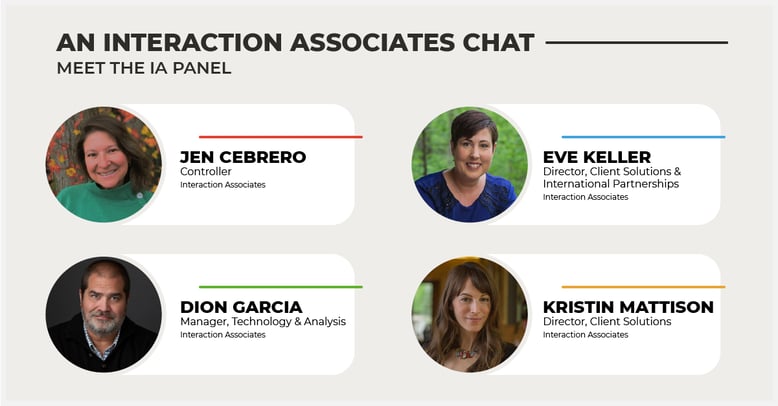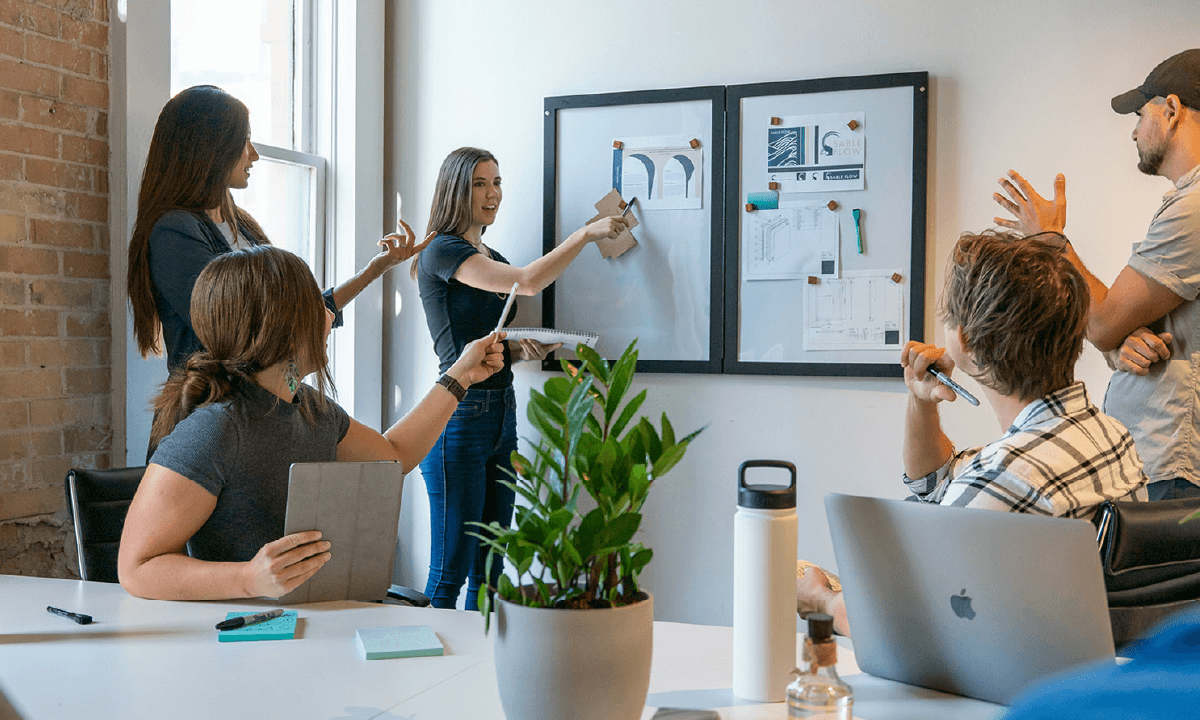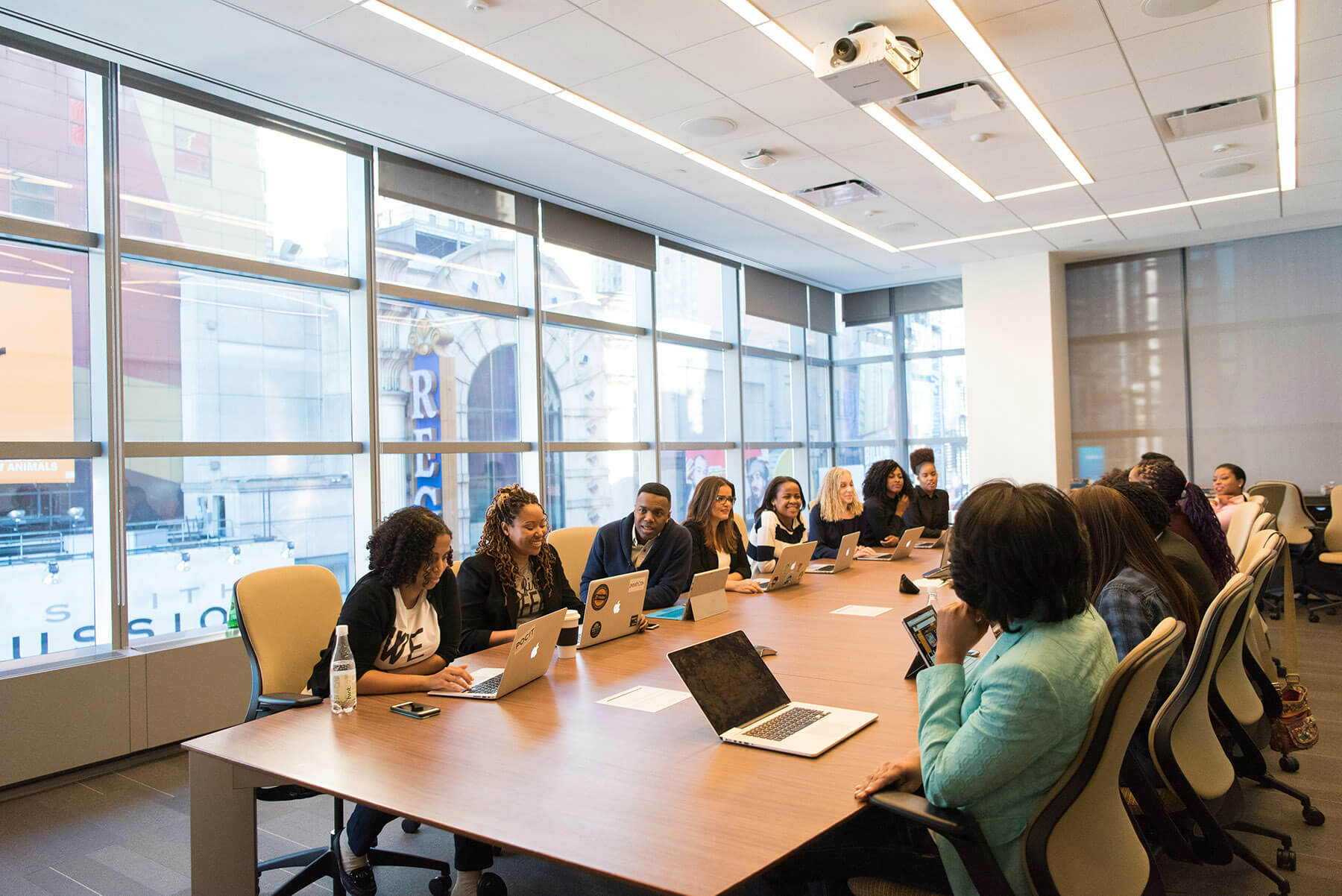IA Insights > Blog
IA Chat: Managing Stress & Maintaining Your Mental Health
IA Chat: Managing Stress & Maintaining Your Mental Health
In this edition of Interaction Associates Chat, a group of IA leaders got together on a Microsoft Teams chat to discuss tips and practices they use throughout the year to manage stress and maintain their mental health. Below is the lightly edited transcript of that discussion.

Katy O'Connor (moderator): Stress at work has always been a common issue. What makes the stress we’re facing today any different than years past?
Jen Cebrero: When COVID entered the picture in 2020, it brought along with it stressors we never thought we’d experience. As a result, people are working remote, in the office, or a mix. All of this can contribute to more stressors.
Eve Keller: Early on in the COVID-era we all were much more aware of our bodies, our anxiety, and our coping mechanisms - whether healthy or not.
Also, we had less resources and took on more work during COVID, thereby adding to our stress at work. Many hats, many projects, lots more workload over everyone. Sometimes that workload led to less collaborative attitudes.
Jen Cebrero: Yes, agreed Eve.
Dion Garcia: Stress from a “remote” location is different, but it’s hard for me to articulate why. I do know that one thing I’m missing is the ability to get things off my chest in a face-to-face manner, whether during a formal meeting or a water cooler conversation.
Kristin Mattison: Working from home can feel like a luxury, until you glance up from the kitchen table to notice the dishwasher needs to be emptied, or laundry put away. Housework and errands were always there, and always will be, and working full-time from home may cause some to stress over these things more.
Katy O'Connor (Moderator): It seems like the entire shift in the workplace over the last three years including remote work and the stress of COVID contribute to our stress inside and outside of the workplace. What are preventative measures have you adopted in your daily work to avoid common stressors?
Jen Cebrero: I stretch and try to focus on a new day, a new beginning. During the day if I feel stressed out, I will take the pups for a walk and get some fresh air and try to settle my head.
When I am working on something alone, I put some music on to help with the silence.
Dion Garcia: Step away from the desk, quick walk, breathe, come back, and refocus. I've benefited from practicing mindfulness, but I have a long way to go.
Eve Keller: I use Microsoft Viva and Insights to help me manage my emails, tasks, and meetings. I create shorter meetings with my Outlook settings also. I build in focus time and time blocks for large tasks. Outside of work, I have done better in my morning routines and afternoon routines. For example, I try to walk the dog and have some fruit and hot tea at 3pm each day. It's on my calendar as a personal block for me.
Dion Garcia: @Eve Keller: Setting time on the calendar is a best practice that I almost never do.
Kristin Mattison: Improving my morning routine has helped tremendously with stress. Dedicating time to my success first thing in the morning is the way to go (for me). Success could be waking up before my alarm, showering, making the bed, sending the kids off to school on a good note, or yoga. When I miss time in the morning to set myself up for success, I tend to stress a bit more.
Jen Cebrero: I keep a notebook and have my daily, monthly tasks listed out. When I complete tasks, I check them off. It makes me feel like I have accomplished something.
Eve Keller: I practice mindfulness daily. My new Meta Quest 2 Oculus Tripp program really helps to focus in the morning and calm in the evening before bed.
Jen Cebrero: I also set time in my calendar for some longer tasks. Each day I have some time set for 1/2 hour of yoga or walking the pups. Some days I have to remove it, but at least it starts there at the beginning of the week! 😀
Eve Keller: I use an Inner Guide planner that really helps set weekly intentions, monthly goals in 9 areas and reflection over the past month.
Kristin Mattison: Calendar blocking in advance helps me stick to stepping away from the workplace easier. I no longer (when I choose to do it) multi-task. I've learned you can only task switch and that's a good thing for our mind and stress. One thing at a time.
Katy O'Connor (moderator): I like that Kristin, time blocking is an extremely effective practice. If our readers want to learn more about it, they can check out the article from IA COO, Chris Williams on how this practice has impacted his life.
I love hearing about everyone’s small routines - the little things we do truly make an impact. While we can build in these preventative measures, as they say “shit happens.” It seems that you all have some habits built into your daily routines, but what interventions have you used in the past to get rid of or at least subdue potential stressors that pop up?
Eve Keller: I try to "practice the pause" when something or someone triggers a negative response. I know I don't have to reply right away to that email or voicemail no matter how much I really want to. Also, in meetings I can do this by applying lotion to my hands before responding.
Kristin Mattison: When things feel like they're piling up - I look for moments of gratitude to remind myself that it's good to be busy, needed, and important to the outcome of X. It comes down to an individual’s mindset and how they view the tasks in front of them.
Jen Cebrero: If I get a negative email that I need to respond to I normally do it the next day when my emotions are put away.
Dion Garcia: I try to always assume the best of intent on the part of the email sender. If I ever struggle with that, the delayed reaction is the best path forward.
Katy O'Connor (moderator): Being able to regulate the instinctual emotional reaction to stress is often the most challenging thing to do. It seems like you guys have all got it down!
Dion Garcia: I try to have an awareness of how I react emotionally to things, if I think I may be. We all have blind spots though, and I'm sure I have denied an emotional reaction when I have in fact had one.
Katy O'Connor (moderator): Outside of stressful emails, are there any other preventative measures you take to get rid of or at least subdue those stressors that creep up?
Kristin Mattison: Take a beat before responding to anything emotionally charged. I combat this by phoning a friend to get a perception check.
Jen Cebrero: Phone a friend is great! I have a best friend who was my Controller & mentor years ago. We call each other a lot to bounce things off each other. It is very helpful!
Eve Keller: I have a home gym with weights and a punching bag. That helps to get that energy somewhere else.
Box breathing is a good release of stress as well. I've also learned that temperature change is good for lowering your stress.
Kristin Mattison: Take it one task at a time until your brain and body tell you it's time to break. When an email, meeting, or even a relationship feels heavy and have resistance – like when you're putting too much effort towards it and NOT enjoying the process - it's time for a break.
Jen Cebrero: I usually do breathing exercises before a stressful meeting or call.
Dion Garcia: Music. A very specific type of music brings me comfort.
Jen Cebrero: Music helps me too, Dion. MJ is my first choice.
Katy O'Connor (moderator): Burnout has been a trending topic recently but has existed for years. I am curious if any of you have experienced it before and what advice would you give to those individuals who are currently facing or very close to facing burnout in their job?
Jen Cebrero: I have a friend who is facing it. I try to get him to put time in his calendar to walk...go outside and take a break. It hasn't been working so I told him to update his resume, but he says he doesn't have time for that!
Dion Garcia: I feel for your friend. I've been there at one time. It's a difficult position to be in.
Jen Cebrero: Sometimes the person who is burning out needs to look inside and see what they may be able to change with their daily lives.
Dion Garcia: @Jen Cebrero: You nailed it!
Jen Cebrero: Yes, they need to help themselves first.
Kristin Mattison: Listen to your inner guidance system and recognize when moments of resistance (that ultimately lead to burnout) pop-up.
Eve Keller: I think clarity in your role and expectations really helps to combat burnout. Make sure you feel valued in what you bring and are valuable in what you do. It should challenge you in the best way possible. Be sure to have an outlet or friend to vent to, a sponsor at work to help lift up your concerns, and a mentor outside of work to help frame your perspective better.
Dion Garcia: Burnout requires change at some level. The job may only be part of the problem, so looking within is sound advice.
Katy O'Connor (moderator): This is all wonderful advice. Did anyone have any final words they would like to share on this topic or any of the previous questions we talked about?
Dion Garcia: There's some good advice in this thread.
Eve Keller: Stress isn't always bad but continued stress can really take a toll on the human mind, body, and soul. We only grow when we are uncomfortable. But understand that growth is change and change is inevitable.
One thing we are hearing from many of our clients is that common stressors are heightened when workers are stuck in back-to-back meetings that aren't productive. Our popular program, Essential Facilitation™, provides time-tested solutions that have been proven to upend unproductive meeting cultures and move to an environment that not only cuts down on the number of meetings but makes the time spent in them much more valuable and action-oriented. Change your company's meeting culture and boost group facilitation skills by exploring Essential Facilitation today.
About IA Team
Interaction Associates (IA) helps leaders and teams think more clearly, collaborate more effectively, and focus on what matters most to their customers, employees, and stakeholders. We provide our clients with practical methods for helping people work better together across functions, viewpoints, and geographies. Since IA introduced the concept and practice of group facilitation to the business world in 1969, hundreds of thousands of individuals have learned The Interaction Method™, a facilitated approach for building understanding and agreement so people can take informed, concerted action.





